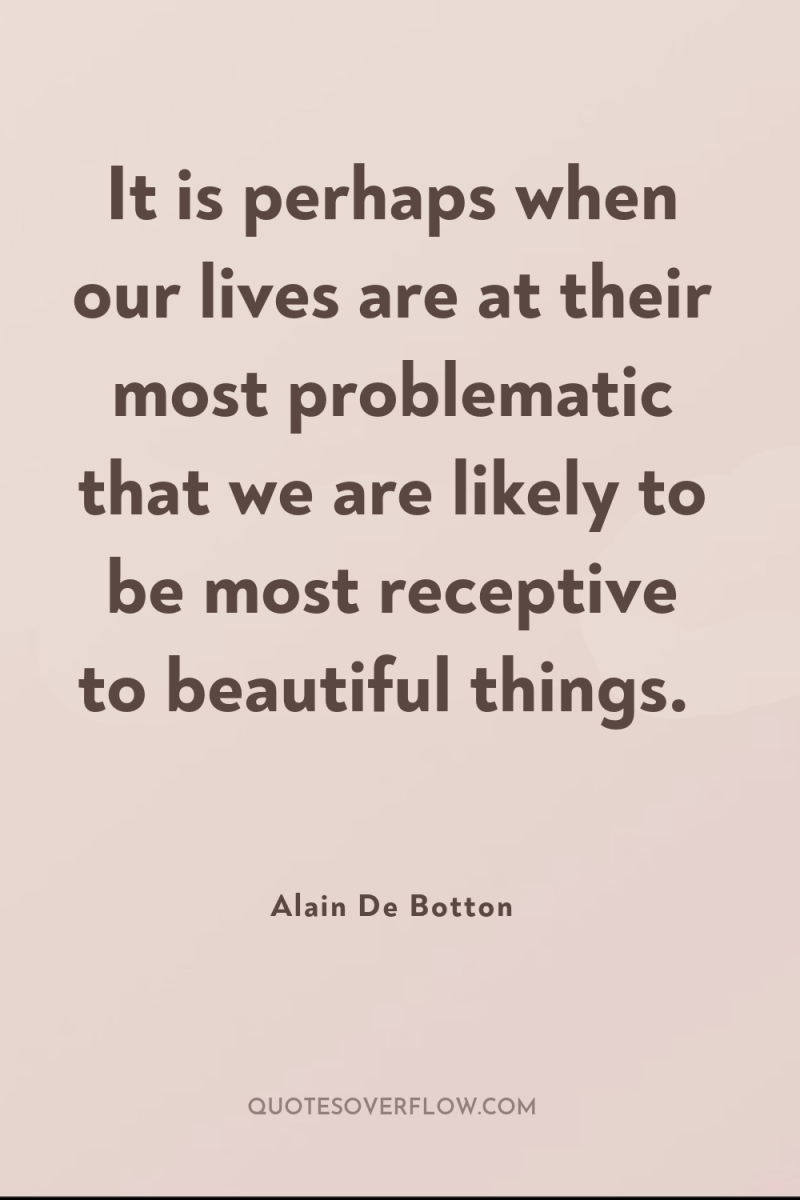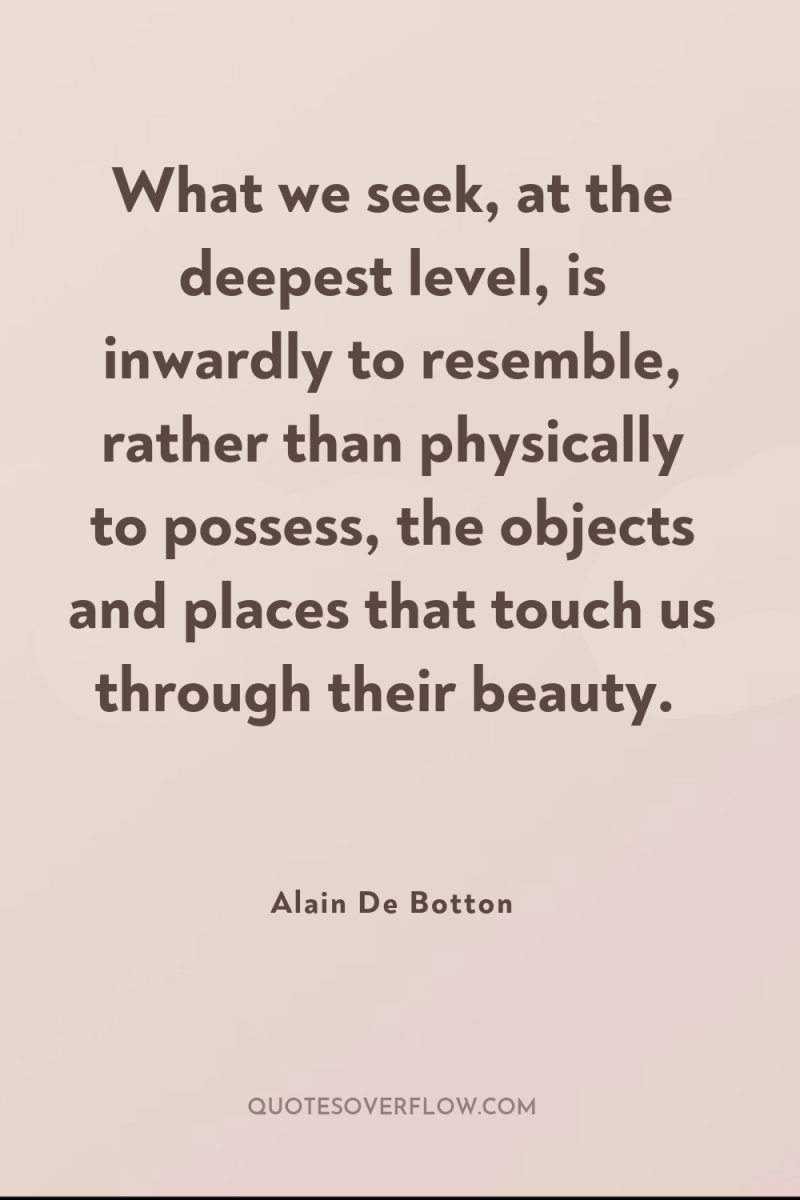
1
It is perhaps when our lives are at their most problematic that we are likely to be most receptive to beautiful things.Alain De Botton

2
What we seek, at the deepest level, is inwardly to resemble, rather than physically to possess, the objects and places that touch us through their beauty.Alain De Botton
3
It is in dialogue with pain that many beautiful things acquire their value. Acquaintance with grief turns out to be one of the more unusual prerequisites of architectural appreciation. We might, quite aside from all other requirements, need to be a little sad before buildings can properly touch us.Alain De Botton
4
It is in books, poems, paintings which often give us the confidence to take seriously feelings in ourselves that we might otherwise never have thought to acknowledge.Alain De Botton
5
In literature, too, we admire prose in which a small and astutely arranged set of words has been constructed to carry a large consignment of ideas. 'We all have strength enough to bear the misfortunes of others, ' writes La Rochefoucauld in an aphorism which transports us with an energy and exactitude comparable to that of Maillard bridge. The Swiss engineer reduces the number of supports just as the French writer compacts into a single line what lesser minds might have taken pages to express. We delight in complexity to which genius has lent an appearance of simplicity. (p 207) .Alain De Botton
6
Our sadness won’t be of the searing kind but more like a blend of joy and melancholy: joy at the perfection we see before us, melancholy at an awareness of how seldom we are sufficiently blessed to encounter anything of its kind. The flawless object throws into perspective the mediocrity that surrounds it. We are reminded of the way we would wish things always to be and of how incomplete our lives remain.Alain De Botton
7
While a common reaction to seeing a thing of beauty is to want to buy it, our real desire may be not so much to own what we find beautiful as to lay permanent claim to the inner qualities it embodies. Owning such an object may help us realise our ambition of absorbing the virtues to which it alludes, but we ought not to presume that those virtues will automatically or effortlessly begin to rub off on us through tenure. Endeavouring to purchase something we think beautiful may in fact be the most unimaginative way of dealing with the longing it excites in us, just as trying to sleep with someone may be the bluntest response to a feeling of love. What we seek, at the deepest level, is inwardly to resemble, rather than physically possess, the objects and places that touch us through their beauty. .Alain De Botton
8
We need a home in the psychological sense as much as we need one in the physical: to compensate for a vulnerability. We need a refuge to shore up our states of mind, because so much of the world is opposed to our allegiances. We need our rooms to align us to desirable versions of ourselves and to keep alive the important, evanescent sides of us.Alain De Botton
9
We depend on our surroundings obliquely to embody the moods and ideas we respect and then to remind us of them. We look to our buildings to hold us, like a kind of psychological mould, to a helpful vision of ourselves. We arrange around us material forms which communicate to us what we need – but are at constant risk of forgetting what we need – within. We turn to wallpaper, benches, paintings and streets to staunch the disappearance of our true selves. .Alain De Botton
10
It is in dialogue with pain that many beautiful things acquire their value.Alain De Botton
11
[Donald] Keene observed [in a book entitled The Pleasures of Japanese Literature, 1988] that the Japanese sense of beauty has long sharply differed from its Western counterpart: it has been dominated by a love of irregularity rather than symmetry, the impermanent rather than the eternal and the simple rather than the ornate. The reason owes nothing to climate or genetics, added Keene, but is the result of the actions of writers, painters and theorists, who had actively shaped the sense of beauty of their nation. Contrary to the Romantic belief that we each settle naturally on a fitting idea of beauty, it seems that our visual and emotional faculties in fact need constant external guidance to help them decide what they should take note of and appreciate. 'Culture' is the word we have assigned to the force that assists us in identifying which of our many sensations we should focus on and apportion value to. .Alain De Botton
12
What we call a home is merely any place that succeeds in making more consistenly available to us the important truths which the wider world ignores, or which our distracted and irresolute selves have trouble holding onto." (p123) Architecture of HappinessAlain De Botton
13
For us to deem a work of architecture elegant, it is hence not enough that it look simple: we must feel that the simplicity it displays has been hard won, that it flows from the resolution of demanding technical or natural predicament. Thus we call the Shaker staircase in Pleasant Hill elegant because we know--without ever having constructed one ourselves--that a staircase is a site complexity, and that combinations of treads, risers and banisters rarely approach the sober intelligibility of the Sharkers' work. We deem a modern Swiss house elegant because we not how seamlessly its windows have been joined to their concrete walls, and how neatly the usual clutter of construction has been resolved away. We admire starkly simple works that we intuit would, without immense effort, have appeared very complicated. (p 209) .Alain De Botton
14
Insofar as we appreciate order, it is when we perceive it as being accompanied by complexity, when we feel that a variety of elements has been brought to order--that windows, doors and other details have been knitted into a scheme that manages to be at once regular and intricate. (p184)Alain De Botton